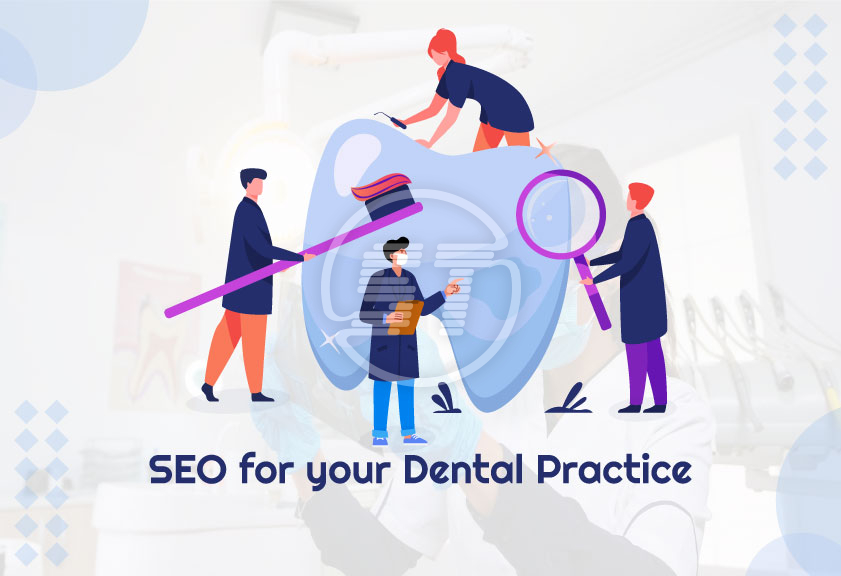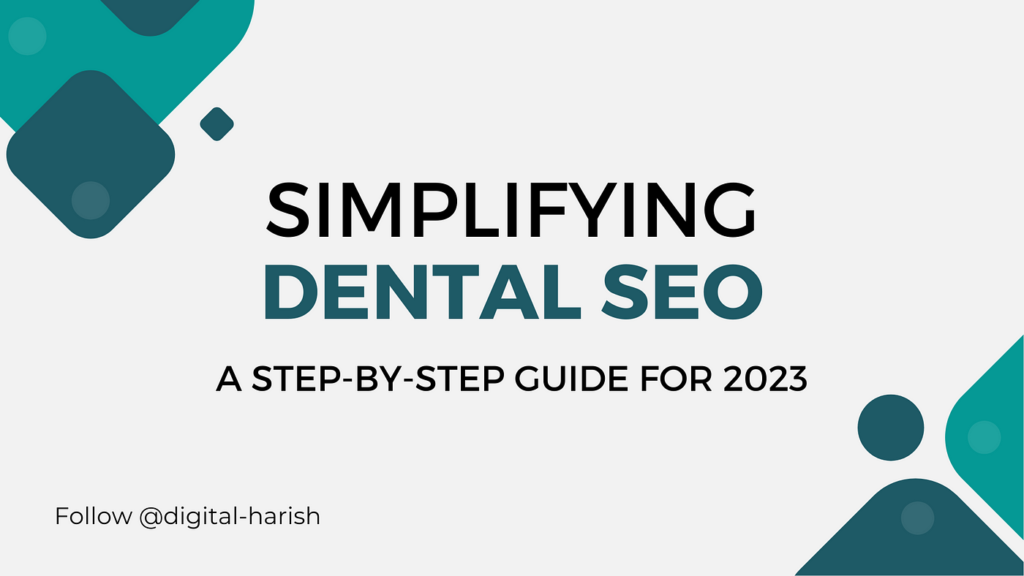Are you running a dental practice and looking to gain an edge over your competitors? One strategy that could give you a significant advantage is investing in dental SEO. By optimizing your website and online presence, you can ensure that your practice appears at the top of search engine results when potential patients are looking for dental services in your area. With Ortho Advertising, an experienced SEO agency located in Philadelphia, you can create compelling articles that specifically target dentists and orthodontists, helping you stand out from the crowd. Don’t miss out on the opportunity to get ahead of the competition and attract more patients to your practice with dental SEO.

Understanding Dental SEO
What is Dental SEO?
Dental SEO refers to the practice of optimizing a dental website to improve its visibility and ranking on search engine results pages (SERPs). It involves various strategies and techniques that aim to attract more organic traffic and potential patients to a dental practice’s website. By implementing dental SEO, dentists and orthodontists can increase their online presence, reach a wider audience, and ultimately grow their patient base.
Why is Dental SEO Important?
In today’s digital age, where the majority of people turn to search engines like Google when looking for dental services, having a strong online presence is crucial for any dental practice. Dental SEO plays a pivotal role in helping dentists and orthodontists rank higher on SERPs, making it easier for potential patients to find them. By optimizing their websites, dental practices can increase their visibility, attract more qualified leads, and ultimately convert them into loyal patients. Dental SEO is a vital component of a comprehensive digital marketing strategy for dental practices.
The Benefits of Dental SEO
Implementing dental SEO strategies comes with numerous benefits for dental practices:
- Increased Visibility: Dental SEO improves a practice’s online visibility, making it easier for potential patients to discover them when searching for dental services.
- Targeted Traffic: By optimizing their websites with relevant keywords and location-specific content, dentists can attract highly targeted traffic of individuals actively seeking dental services in their area.
- Enhanced Reputation: Ranking higher on search engines instills trust and credibility in potential patients, as it signifies that a dental practice is reliable and reputable.
- Cost-Effective Marketing: Compared to traditional advertising methods, dental SEO is a cost-effective way to market a dental practice, as it targets individuals who are actively searching for dental services.
- Long-Term Results: Unlike paid advertising campaigns, dental SEO strategies lead to long-term results, allowing dental practices to continue reaping the benefits even after the initial optimization efforts.
Optimizing Your Website
Using Relevant Keywords
One of the primary components of dental SEO is using relevant keywords throughout your website’s content. These keywords are terms that potential patients might use when searching for dental services online. By incorporating these keywords naturally into your website’s copy, page titles, headings, and image alt text, search engines can better understand the content of your pages and rank them accordingly. Additionally, it is crucial to consider location-specific keywords to target individuals in your area.
When choosing keywords, it is essential to strike a balance between competitiveness and relevance. While highly competitive keywords might have a higher search volume, they will also face strong competition from other dental practices. It is often wise to focus on long-tail keywords, which are more specific and have less competition, giving you a better chance of ranking higher in the search results.
Optimizing Meta Tags and Headers
Meta tags and headers play a crucial role in helping search engines understand the structure and content of your dental website. Meta tags, such as the meta title and meta description, provide concise summaries of your webpages and appear in search engine results. These tags should be optimized with relevant keywords and provide a compelling description to encourage users to click through to your website.
Headers, represented by HTML tags such as H1, H2, and H3, help organize the content of your pages and make them easier to navigate for both users and search engines. It is important to include your target keywords naturally in these headers to further enhance their relevance and optimize your website for dental SEO.
Improving Site Speed and Mobile Responsiveness
In today’s fast-paced digital world, users expect websites to load quickly and be easily viewable on mobile devices. Thus, optimizing your dental website for speed and mobile responsiveness is crucial for dental SEO. Slow-loading pages can lead to higher bounce rates and a negative user experience, ultimately impacting your website’s ranking on search engine results pages.
To improve site speed, consider optimizing images and videos to reduce their file sizes, leveraging browser caching, and minimizing the use of unnecessary plugins or scripts. Additionally, ensuring that your website is mobile-responsive is essential, as an increasing number of users are accessing the internet via mobile devices. Responsive design allows your website to adapt to different screen sizes, providing an optimal user experience and improving your dental SEO efforts.

Content Marketing for Dental SEO
Creating Engaging and Informative Blog Posts
Content marketing is a vital aspect of dental SEO, as it allows dental practices to establish their expertise, provide valuable information to potential patients, and improve their website’s visibility. One effective content marketing strategy is creating engaging and informative blog posts. By leveraging dental-related topics and incorporating relevant keywords, dentists can attract organic traffic and position themselves as a trusted source of dental information.
When creating blog posts, it is essential to write for your target audience and address their pain points and concerns. By providing valuable insights, tips, and answering common questions, you can establish yourself as an authoritative figure in the dental field. Additionally, promoting your blog posts through various channels, such as social media and email marketing, can further enhance their reach and impact on your dental SEO efforts.
Using Video Content to Attract Patients
Incorporating video content into your dental SEO strategy can have a significant impact on attracting and engaging potential patients. Videos allow you to visually showcase your expertise, introduce your dental practice, and provide educational content in a more dynamic and engaging manner.
Consider creating videos that address common dental concerns, explain various dental procedures, or showcase patient testimonials. By optimizing your video titles, descriptions, and tags with relevant keywords, you can improve their visibility on video-sharing platforms like YouTube and enhance their impact on your dental SEO.
Leveraging Social Media for Dental SEO
Social media platforms provide a powerful opportunity for dental practices to connect with their target audience, build brand awareness, and boost their dental SEO efforts. By actively engaging on platforms such as Facebook, Instagram, Twitter, and LinkedIn, dental practices can increase their online visibility and attract more potential patients to their website.
When leveraging social media for dental SEO, it is important to share valuable content, engage with your audience, and promote your dental services. Sharing blog posts, videos, before-and-after photos, and patient testimonials can help showcase your expertise and attract more followers and potential patients. Additionally, engaging with your audience through comments, direct messages, and social media ads can further enhance your dental SEO efforts.
Local SEO for Dentists
Claiming and Optimizing Your Google My Business Listing
Local SEO is a crucial aspect of dental SEO, as it allows dental practices to target individuals in their specific geographical area. One important step in local SEO is claiming and optimizing your Google My Business (GMB) listing. GMB is a free tool provided by Google that allows businesses to manage their online presence and appear in local search results.
To optimize your GMB listing, ensure that all information, such as your business name, address, phone number, and website, is accurate and up to date. In addition, selecting the appropriate categories that represent your dental practice and adding high-quality photos can enhance your listing’s visibility and credibility. Encouraging your satisfied patients to leave positive reviews on your GMB listing can also boost your dental SEO efforts.
Building Local Citations
Local citations are online references to your dental practice’s name, address, and phone number (NAP) on other websites, directories, and platforms. Building local citations helps search engines verify the accuracy and legitimacy of your dental practice’s information, improving your local SEO rankings.
To build local citations, start by ensuring that your dental practice’s NAP information is consistent across all online platforms. This includes directories, review sites, social media profiles, and local business listings. Additionally, consider listing your dental practice on relevant industry-specific directories and local directories to further enhance your dental SEO efforts.
Getting Online Reviews from Patients
Online reviews play a significant role in the decision-making process of potential patients. Positive reviews not only improve your dental practice’s reputation and credibility but also impact your dental SEO efforts. Search engines consider online reviews as a trust signal, and practices with higher ratings and positive feedback are more likely to rank higher on local search results.
Encourage your satisfied patients to leave reviews on platforms such as Google, Yelp, Healthgrades, and Facebook. To boost your chances of receiving reviews, consider implementing a review management system and responding to both positive and negative reviews promptly and professionally. The quantity and quality of online reviews will help improve your dental SEO and attract more patients to your practice.

Link Building Strategies
Building High-Quality Backlinks
Building high-quality backlinks is an essential component of dental SEO. Backlinks are links from other websites that direct users to your dental practice’s website. Search engines consider backlinks as a vote of confidence, indicating that your website is trustworthy and reputable.
To build high-quality backlinks, focus on creating valuable content that others will naturally want to link to. This can include informative blog posts, dental guides, or research-backed articles. Additionally, reach out to relevant dental associations, influencers, and industry publications to collaborate on guest blog posts or interviews, which can help you earn authoritative backlinks.
Guest Posting on Dental Industry Websites
Guest posting is a highly effective strategy to build backlinks and increase your dental practice’s online visibility. By writing informative and engaging articles for dental industry websites, you can showcase your expertise and earn valuable backlinks from authoritative sources.
When guest posting, choose reputable dental industry websites that have a strong online presence and align with your target audience. Ensure that your guest posts are well-written, informative, and provide actionable insights for readers. Including a brief author bio and a link back to your dental practice’s website in your guest posts can help drive traffic and improve your dental SEO efforts.
Partnering with Local Businesses for Link Building
Collaborating with other local businesses can be an effective strategy for link building and improving your dental SEO. By forming partnerships with complementary businesses, such as orthodontists, pediatric dentists, or dental supply stores, you can mutually benefit from cross-promotion and linking to each other’s websites.
Consider reaching out to local businesses and exploring opportunities for collaboration, such as co-hosting events, offering joint promotions, or featuring each other on your websites or social media platforms. These partnerships can not only increase your online visibility but also improve your dental SEO through valuable backlinks and increased referral traffic.
Optimizing for Voice Search
Understanding the Rise of Voice Search
With the increasing popularity of voice-activated virtual assistants such as Siri, Alexa, and Google Assistant, optimizing for voice search has become essential for dental SEO. Voice search allows users to perform searches using natural language and conversational queries, often through voice-enabled devices like smartphones or smart speakers.
Understanding the rise of voice search and its impact on dental SEO is crucial for staying ahead of the competition. Voice search queries tend to be longer and more conversational compared to traditional typed searches, and they often have a local intent. This presents an opportunity to optimize your dental website for voice search and capture potential patients who use voice-assisted devices to find dental services in their area.
Creating Conversational and FAQ-Style Content
To optimize your dental website for voice search, focus on creating conversational and FAQ-style content. Voice search queries often mimic natural conversations, so it is important to use a conversational tone throughout your website’s content. Incorporate long-tail keywords that reflect common voice search queries, and provide direct and concise answers to frequently asked questions.
Consider creating a dedicated FAQ page or section on your website where you address common dental concerns, treatment options, payment methods, and other relevant topics. Structure your answers in a clear and concise format that is easy for voice assistants to extract and read aloud. By providing valuable and comprehensive answers to voice search queries, you can improve your dental SEO and attract more patients.
Optimizing for Local Voice Searches
Given the local intent of many voice search queries, it is essential to optimize your dental website for local voice searches. Local voice searches often include phrases like “dentists near me” or “best orthodontist in [location].” To capture these potential patients, focus on incorporating location-specific keywords throughout your website’s content.
Include your dental practice’s city, neighborhood, or nearby landmarks in your website’s page titles, headings, meta tags, and content. Additionally, claim and optimize your Google My Business listing with accurate and updated location information. By tailoring your dental SEO efforts to target local voice searches, you can increase your online visibility and attract more patients in your area.

Tracking and Analyzing Dental SEO Performance
Using Google Analytics to Measure Traffic and Conversions
Google Analytics is a powerful tool that provides valuable insights into your website’s performance, user behavior, and conversion rates. By integrating Google Analytics into your dental website, you can track and analyze important metrics related to your dental SEO efforts.
Monitor metrics such as website traffic, bounce rate, time on page, and conversion rates to evaluate the effectiveness of your dental SEO strategies. Identify trends and patterns, and make data-driven decisions to optimize your website and improve its performance. Regularly reviewing and analyzing your website’s performance using Google Analytics will help you identify areas for improvement and refine your dental SEO strategy.
Monitoring Keyword Rankings
Monitoring keyword rankings is an essential practice in dental SEO as it allows you to track your website’s visibility and performance on search engine results pages. By regularly tracking your keyword rankings, you can assess the effectiveness of your dental SEO efforts, identify opportunities for improvement, and stay ahead of the competition.
Utilize keyword tracking tools to monitor the rankings of your target keywords. Identify any fluctuations or significant changes in your rankings and investigate potential reasons behind these shifts. By staying informed about your keyword rankings, you can make necessary adjustments to your dental SEO strategy and maintain a strong online presence.
Analyzing User Behavior on Your Website
Understanding the behavior of users on your dental website is vital for optimizing your dental SEO strategy. By analyzing user behavior, you can gain insights into how visitors interact with your website, which pages they visit the most, and where they drop off in their patient journey.
Utilize heatmaps, click-through rates, and user flow analysis tools to visualize and analyze user behavior on your website. Identify high-performing pages that drive conversions and engagement, and identify areas where users may be encountering issues or experiencing drop-offs. This data will help you make informed decisions to improve the user experience, optimize your dental SEO efforts, and ultimately increase patient conversions.
Staying Abreast of Dental SEO Trends
Keeping Up with Search Engine Algorithm Updates
Search engine algorithms are continually evolving, which means dental SEO strategies need to adapt to stay effective. It is crucial for dentists and orthodontists to stay abreast of search engine algorithm updates to ensure their websites comply with the latest ranking factors and recommendations.
Follow reliable industry news sources and blogs that provide updates on search engine algorithms, such as Google’s algorithm updates. Understanding changes in ranking factors, penalties, and best practices will help you make necessary adjustments to your dental SEO strategy and maintain a competitive edge.
Following Industry Influencers and Blogs
Following industry influencers and reputable dental SEO blogs is an effective way to stay informed about the latest trends and best practices in dental SEO. Influencers and thought leaders often share valuable insights, tips, and case studies that can help you improve your dental SEO efforts.
Engage with industry influencers on social media, subscribe to their newsletters, and participate in discussions to stay connected and gain access to valuable information. Additionally, follow reputable dental SEO blogs and contribute to the conversation by sharing your own experiences and insights.
Attending SEO Conferences and Webinars
Attending SEO conferences and webinars dedicated to dental SEO is an excellent opportunity to network with industry professionals and stay updated on the latest trends and strategies. Conferences often feature keynote speakers, workshops, and panel discussions that cover a wide range of dental SEO topics.
Take advantage of these events to learn from experts, participate in hands-on workshops, and engage in discussions with fellow dental SEO practitioners. Attending SEO conferences and webinars will not only enhance your knowledge but also provide valuable networking opportunities and connections within the dental SEO community.

Choosing the Right Dental SEO Agency
Researching and Comparing Dental SEO Agencies
When looking for a dental SEO agency to partner with, it is essential to conduct thorough research and compare your options. Look for dental SEO agencies that specialize in working with dental practices and have a proven track record of delivering results.
Consider factors such as the agency’s experience, expertise, and the services they offer. Review their portfolio and case studies to evaluate the results they have achieved for other dental practices. Additionally, take into account their approach to dental SEO, the strategies they employ, and their commitment to delivering personalized solutions.
Checking Client Reviews and Testimonials
Client reviews and testimonials provide valuable insights into the performance and reliability of a dental SEO agency. Check online review platforms, such as Google My Business, Yelp, and industry-specific forums, for feedback from current or past clients.
Pay attention to the overall satisfaction level, the agency’s responsiveness and communication, and the results they have achieved for other dental practices. Positive client reviews and testimonials are a good indicator of an agency’s trustworthiness and their ability to deliver effective dental SEO solutions.
Inquiring About Strategy and Reporting
When considering a dental SEO agency, inquire about their approach to strategy development and reporting. A reputable agency should be able to provide a clear and transparent strategy customized to your dental practice’s goals and target audience.
Ask about their reporting frequency and the metrics they track to measure the effectiveness of their dental SEO efforts. A reliable agency should provide regular reports detailing key performance indicators, keyword rankings, website traffic, and conversions. Clear and comprehensive reporting will help you evaluate the impact of their dental SEO strategies and make informed decisions to optimize your online presence.
Conclusion
Dental SEO is a crucial aspect of any dental practice’s digital marketing strategy. By understanding the importance of dental SEO and implementing effective strategies, dentists and orthodontists can enhance their online visibility, attract more qualified leads, and grow their patient base. From optimizing your website and creating engaging content to leveraging local SEO and staying up to date with the latest trends, dental SEO is a continuous process that requires dedication and expertise. By choosing the right dental SEO agency and regularly tracking and analyzing performance, dental practices can stay ahead of the competition and achieve long-term success in the digital landscape.

